 Katrina making landfall over the Gulf Coast.
Katrina making landfall over the Gulf Coast. 
 Katrina BEFORE it hit Florida
Katrina BEFORE it hit Florida 
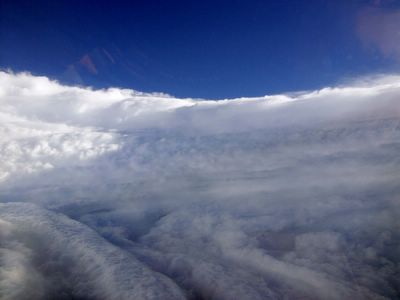 Katrina's Eyewall, that of a Category 5 storm that was an eddy to a vortex.
Katrina's Eyewall, that of a Category 5 storm that was an eddy to a vortex. 
 March 13, 2006. Springfield, Illinois. Photographer states :: It happened Sunday, March 12th and the National Weather Service reports there were 2 tornados that hit Springfield, both F2 on the Fujita scale. It was a scary night!
March 13, 2006. Springfield, Illinois. Photographer states :: It happened Sunday, March 12th and the National Weather Service reports there were 2 tornados that hit Springfield, both F2 on the Fujita scale. It was a scary night! 
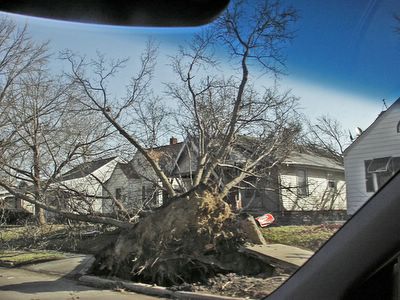 March 13, 2006. Springfield, Illinois
March 13, 2006. Springfield, Illinois 
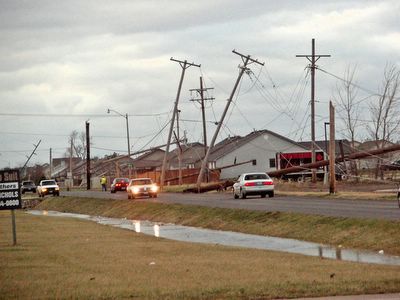 March 13, 2006. Springfield, Illinois
March 13, 2006. Springfield, Illinois 
 March 17, 2003. Seattle, Oregon.
March 17, 2003. Seattle, Oregon. 
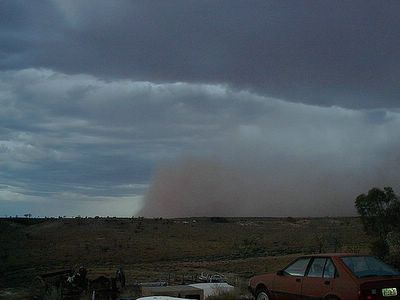 March 15, 2006.Kararo Hills, Australia. Photographer states :: Dry times again! From a maximum temperature of 40deg C and within a few minutes a change from the south dropped the temperature to 20 degs C. Along with the temperature drop came a howling dust and sand storm reducing visibility to less than 100 metres. Winds strong enough to lift sand the size of rice grains to one metres and fine swirling dust to 1,500 metres. But it only lasted a few minutes and then a few spots of rain but we are still waiting for a break in the season (to give some useful rainfalls).
March 15, 2006.Kararo Hills, Australia. Photographer states :: Dry times again! From a maximum temperature of 40deg C and within a few minutes a change from the south dropped the temperature to 20 degs C. Along with the temperature drop came a howling dust and sand storm reducing visibility to less than 100 metres. Winds strong enough to lift sand the size of rice grains to one metres and fine swirling dust to 1,500 metres. But it only lasted a few minutes and then a few spots of rain but we are still waiting for a break in the season (to give some useful rainfalls).
Statement by the UN General Secretary March 17, 2006:Despite some progress, making the transition to sustainable development has not yet taken on the urgency it needs. I am pleased to know that Madagascar is a party to the Kyoto Protocol. And I hope not only that your efforts will continue, but also that Madagascar will help others facing similar challenges. The United Nations, for its part, will continue to be your close partner. Our system has had a presence here since you gained independence nearly half a century ago. Our agencies are here in full force, working as an integrated country team to help you in areas ranging from governance and education to AIDS and disaster prevention. I am pleased to note that the first annual review of the UN Development Assistance Framework for Madagascar took place this week, and that important gains have been achieved. To help the United Nations work more coherently here in Madagascar, and indeed everywhere, I have just named a panel to explore how the work of the United Nations system in the areas of development, humanitarian assistance and the environment can be made more coherent and more effective. World leaders called for such a study at last September's World Summit in New York. It is intended to lay the groundwork for a fundamental restructuring of the work done by different UN funds, programmes and agencies. We are also pressing ahead with other follow-up to the Summit. Member States have created a new Peace-building Commission and a new Central Emergency Response Fund for humanitarian relief. We have launched a Democracy Fund to strengthen institutions and ensure that people are able to exercise their democratic rights. And just two days ago, the General Assembly took the historic step of creating a new Human Rights Council, which would enable us to make a fresh start in this area and restore the Organization's credibility. Also as requested by the Summit, I have given the membership a new set of reform proposals, calling for a radical overhaul of our management systems. Previous rounds of reform have made the Organization more efficient and more effective than it was 10 years ago. But the current effort will focus on the operational nature of our activities, be it in peacekeeping, development assistance, human rights monitoring, emergency relief, criminal justice and much more. We are an Organization in the midst of change. I very much look forward to an even deeper partnership between a renewed United Nations and the people of Madagascar.
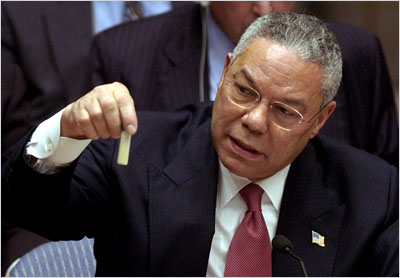 Powell and a vial of anthrax at the UN. What was he thinking bringing a weapon of mass destuction into the chambers of the United Nations? He could have dropped the damn thing and then what would have happened. Sensationalism and pure stupidy.
Powell and a vial of anthrax at the UN. What was he thinking bringing a weapon of mass destuction into the chambers of the United Nations? He could have dropped the damn thing and then what would have happened. Sensationalism and pure stupidy.
Bush invaded Iraq without the final resolution from the UN Security Council. He moved illegally against the Senate and House directives legislated to direct the Executive Branch's actions. The House never impeached him and they should have, without a second thought. He acted against the wishes of the people of the USA. March 17, 2003 President Says Saddam Hussein Must Leave Iraq Within 48 Hours THE PRESIDENT: My fellow citizens, events in Iraq have now reached the final days of decision. For more than a decade, the United States and other nations have pursued patient and honorable efforts to disarm the Iraqi regime without war. That regime pledged to reveal and destroy all its weapons of mass destruction as a condition for ending the Persian Gulf War in 1991.New York - Press Encounter with the Secretary-General at the Security Council stakeout 17 March SG: Good morning, ladies and gentlemen. I've just come out of a [Security] Council meeting where we discussed the situation in Iraq. Obviously the members of the Council who had hoped for a long time that it ought to be possible to disarm Iraq peacefully and had hoped to be able to come up with a common position, are today disappointed and frustrated and are worried that they were not able to muster the collective will to find a common basis to move ahead. And obviously, we seem to be at the end of the road here. Yesterday UNMOVIC, the [International] Atomic [Energy] Agency and myself got information from the United States authorities that it would be prudent not to leave our staff in the region. I have just informed the Council that we will withdraw the UNMOVIC and Atomic Agency inspectors, we will withdraw the UN humanitarian workers, we will withdraw the UNIKOM troops on the Iraqi-Kuwaiti border who are also not able to operate. The implication of these withdrawals will mean that the mandates will be suspended because it will be inoperable. We can not, for example, handle the Oil for Food when we do not have inspectors to monitor the imports, we do not have oil inspectors who will monitor exports of oil, and we don't have the humanitarian personnel who will monitor the distribution, receipt and distribution of the food supply. So, I have informed the Council of these suspensions. This does not mean that, should war come to Iraq, the UN will sit back and not do anything to help the Iraqi population. We will find a way of resuming our humanitarian activities to help the Iraqi people who have suffered for so long and do whatever we can to give them assistance and support. And as you know we have undertaken major contingency planning to be able to move forward as soon as we can. Q: Did you get an authorization from the Security Council to withdraw these inspectors or did you use the measures you have available to you, temporary relocation of the inspectors?
SG: It is relocation of the inspectors, and the Council has taken note of my decision. Q: Should the United States go ahead and its allies and use military action against Iraq without UN Security Council authorization, would that be in violation of international law according to you? SG: I think my position on that is very clear. The Council will have to discuss that also.
Q: Do you believe part of 1441, is it legal or not legal? SG: I think I have made my position very clear on that and I have indicated to you that if ... let's have a bit of order and calm here....I have made it very clear that in my judgement if the Council were to be able to manage this process successfully and most of the collective will to handle this operation, its own reputation and credibility would have been enhanced. And I have also said if the action is to take place without the support of the Council, its legitimacy will be questioned and the support for it will be diminished. March 18, 2003 Dear Mr. Speaker: (Dear Mr. President:) Consistent with section 3(b) of the Authorization for Use of Military Force Against Iraq Resolution of 2002 (Public Law 107-243), and based on information available to me, including that in the enclosed document, I determine that: (1) reliance by the United States on further diplomatic and other peaceful means alone will neither (A) adequately protect the national security of the United States against the continuing threat posed by Iraq nor (B) likely lead to enforcement of all relevant United Nations Security Council resolutions regarding Iraq; and (2) acting pursuant to the Constitution and Public Law 107-243 is consistent with the United States and other countries continuing to take the necessary actions against international terrorists and terrorist organizations, including those nations, organizations, or persons who planned, authorized, committed, or aided the terrorist attacks that occurred on September 11, 2001. Sincerely, GEORGE W. BUSHAS DELIVERED
THE SECRETARY-GENERAL---STATEMENT TO THE SECURITY COUNCIL----New York, 19 March 200319 March Thank you, Mr. President. Excellencies, Needless to say, I fully share the regrets expressed by many members of the Council at the fact that it has not been possible to reach a common position. Whatever our differing views on this complex issue, we must all feel that this is a sad day for the United Nations and the international community. I know that millions of people around the world share this sense of disappointment, and are deeply alarmed by the prospect of imminent war. Let me here pay tribute to the United Nations staff – both international and Iraqi – who have worked so hard in Iraq up to the last possible moment. That includes the inspectors, whose work has now sadly been suspended. I would like to pay special tribute to Dr. [Hans] Blix, Dr. [Mohamed] El Baradei and [Ramiro] Lopes da Silva, the Humanitarian Coordinator, under whose leadership the staff worked in Iraq. Mr. President, it is the plight of the Iraqi people which is now my most immediate concern, and I have been glad to hear that sentiment shared by all the speakers in this debate. In the past twenty years, Iraqis have been through two major wars, internal uprisings and conflict, and more than a decade of debilitating sanctions. The country's vital infrastructure has been devastated, so that it no longer meets the most basic needs for clean water, health or education. Already, Iraq's most vulnerable citizens – the elderly, women and children, and the disabled – are denied basic health care for lack of medicine and medical equipment. Already, nearly one million Iraqi children suffer from chronic malnutrition. Already, Iraqis are heavily dependent on the food ration which is handed out each month to every family in the country. For more than sixty per cent of the population, this ration is their main source of income. Yet many families have to sell part of it to buy clothes or other essentials for their children. All that is true as we speak. And in the short term, the conflict that is now clearly about to start can only make things worse – perhaps much worse.
Mr. President, I am sure all members of this Council will agree that we must do everything we can to mitigate this imminent disaster, which could easily lead to epidemics and starvation.
Under international law, the responsibility for protecting civilians in conflict falls on the belligerents; in any area under military occupation, responsibility for the welfare of the population falls on the occupying power. Without in any way assuming or diminishing that ultimate responsibility, we in the United Nations will do whatever we can to help. As you know, the humanitarian agencies of the United Nations have for some time been engaged in preparing for this contingency, even while we hoped it could still be averted. We have done our best to assess the possible effects of war, in terms of population displacement and human need, and to position our personnel and equipment accordingly. For these preparations we requested 123.5 million dollars from donors a month ago, but only 45 million have been pledged, and 34 million dollars received, to date. I'm afraid we shall very soon be coming back with an appeal for much larger sums, to finance actual relief operations – and I earnestly hope that Member States will respond with generosity and speed. We have also examined the situation caused by the suspension of the activities of the Oil-for-Food Programme in Iraq, and ways that the Programme could be adjusted temporarily, to enable us to continue providing humanitarian assistance to the people of Iraq during and after hostilities. Such adjustments would require decisions by this Council. I will therefore submit my specific proposals for the Council's consideration - as suggested in your note, Mr. President.
In conclusion, Mr. President, let me express the hope that the effort to relieve the sufferings of the Iraqi people, and to rehabilitate their society after so much destruction, may yet prove to be the task around which the unity of this Council can be rebuilt. Thank you very much.
 March 19, 2006. He wears his lipstick well.
March 19, 2006. He wears his lipstick well. 
'Decapitation attack': U.S. and coalition forces launched missiles and bombs at targets in Iraq Wednesday night, including a "decapitation attack" aimed at Iraqi President Saddam Hussein and other top members of the country's leadership.
Bush address: President Bush announced the start of the military campaign against Iraq shortly afterward in a televised address from the White House.THE PRESIDENT: My fellow citizens, at this hour, American and coalition forces are in the early stages of military operations to disarm Iraq, to free its people and to defend the world from grave danger. On my orders, coalition forces have begun striking selected targets of military importance to undermine Saddam Hussein's ability to wage war. These are opening stages of what will be a broad and concerted campaign. More than 35 countries are giving crucial support -- from the use of naval and air bases, to help with intelligence and logistics, to the deployment of combat units. Every nation in this coalition has chosen to bear the duty and share the honor of serving in our common defense. March 19, 2002
Action to Safeguard Information Regarding Weapons of Mass Destruction and Other Sensitive Documents Related to Homeland Security As noted in many discussions during the past several months, you and your department or agency have an obligation to safeguard Government records regarding weapons of mass destruction. Weapons of mass destruction include chemical, biological, radiological, and nuclear weapons. Government information, regardless of its age, that could reasonably be expected to assist in the development or use of weapons of mass destruction, including information about the current locations of stockpiles of nuclear materials that could be exploited for use in such weapons, should not be disclosed inappropriately.
 Launch of a Tomahawk Cruise Missile
Launch of a Tomahawk Cruise Missile 
 Arrival of a Tomahawk Cruise Missile
Arrival of a Tomahawk Cruise Missile 
 Detonation of a Tomahawk Cruise MIssile
Detonation of a Tomahawk Cruise MIssile
 The finished product of a Tomahawk Cruise Missile
The finished product of a Tomahawk Cruise Missile
End of combat: Just 43 days after announcing the start of the war in Iraq, President Bush on Thursday told the nation that "major combat operations in Iraq have ended." He said the toppling of Saddam Hussein's government was "one victory in a war on terror that began on Sept. 11th, 2001, and still goes on." He spoke not from the White House but from the deck of the aircraft carrrier USS Abraham Lincoln, a dramatic setting that also exerted maximum political effect for the president.Fallujah violence: Following three days of deadly violence in Fallujah, a top U.S. military official here Thursday said there is evidence the incidents are part of an orchestrated effort against American forces by former ruling Baath Party officials. Unidentified assailants Wednesday night tossed two grenades inside a U.S. military compound in the heart of this town west of Baghdad, slightly injuring at least five soldiers, military sources said. The compound is manned by company of soldiers from the 3rd Armored Cavalry Regiment.Civilians killed: Two more Iraqi civilians were killed Wednesday in a clash with U.S. troops, bringing the total in such clashes to 17 in three days of conflict in Fallujah. More than 60 Iraqis have been wounded, hospital and Red Cross officials said.Returning refugees: The U.N. refugee agency has prepared a plan for hundreds of thousands of Iraqis to return to their war-torn country.Shiite pilgrimage: Crowds of Shia Muslims Wednesday chanted and danced in the streets of Karbala on the final day of a pilgrimage long suppressed under Saddam Hussein's rule. Many expressed gratitude to the United States for their newfound freedom but, in the same breath, they warned their liberators to leave Iraq and not divide their country.
 It's Saturday Night
It's Saturday Night 
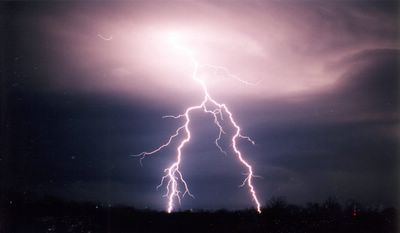 March 11, 2006. Lecoma, Missouri
March 11, 2006. Lecoma, Missouri 
I was deleting all connections to life in this town Sitting Questioning just about everything I've tried And I didn't need solutions you've been wanting me to buyAs the rain fell on the pavementIt relieved my mind Come indetermination I'm your's to command Come true intimidation I'm your's to command Out in the quiet On the wet streets Reflecting red and blue Setting all to zero Nothing old and nothing new From the east side to the west side I'm roaming in the calm Here are pieces I've been missing for so long
 March 11, 2006. Lecoma, Missouri
March 11, 2006. Lecoma, Missouri
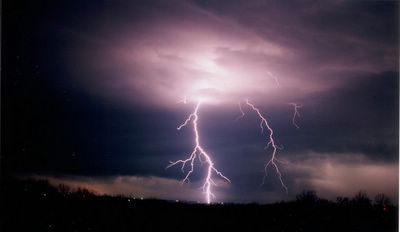 March 11, 2006 Lecoma, Missouri
March 11, 2006 Lecoma, Missouri 



